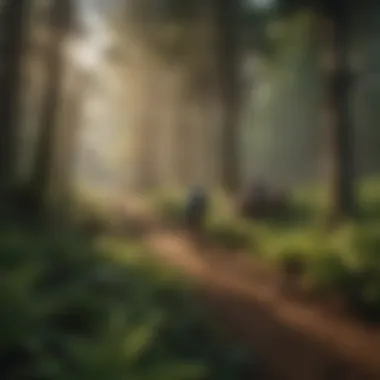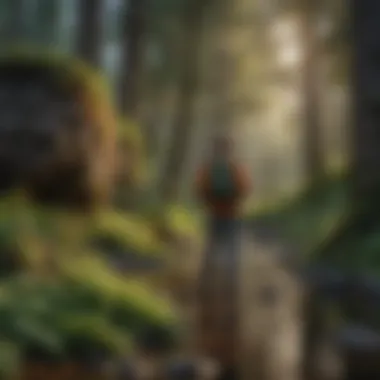Shoreline Park Camp: Nature and Stewardship Unveiled


Intro
Shoreline Park Camp offers a unique environment where outdoor leisure meets environmental education. Situated in a landscape rich with biodiversity, this camp facilitates discussions around forestry practices and sustainable land management. Understanding these themes enriches the visitor experience while fostering a respect for nature.
This article will explore several aspects of the Shoreline Park Camp experience. We will highlight its emphasis on forestry practices, the importance of sustainable management, and innovative techniques that combine traditional knowledge with modern advancements. Such an approach not only enlightens visitors on ecological stewardship but also cultivates appreciation for the forests and shorelines that we must preserve for future generations.
Overview of Forestry Practices
Forestry practices serve as the backbone of managing forested areas effectively. Understanding the significance of these practices is crucial for anyone visiting or involved with Shoreline Park Camp. Through practical sessions and guided experiences, the camp provides insight into how forests are managed for sustainability and ecological health.
Importance of Foresting
Forests are vital ecosystems. They provide essential services, including carbon sequestration, biodiversity, and the regulation of water cycles. The health of our forests directly impacts climate change, wildlife habitats, and air quality. Camp attendees learn about these connections, fostering a sense of responsibility towards forest conservation.
Types of Forestry Practices
There are multiple approaches to forestry, each aiming to achieve different outcomes:
- Selective Logging: This method focuses on the careful removal of specific trees to minimize environmental impact.
- Reforestation: Planting trees in deforested areas helps restore lost ecosystems.
- Agroforestry: Integrating trees with crops or livestock production enhances biodiversity while offering economic benefits.
- Clear-cutting: This controversial method involves removing all trees in an area, often leading to significant ecological changes.
Understanding these practices encourages responsibility in land use and highlights the importance of ethical decision-making in forestry.
Best Practices for Sustainable Woodland Stewardship
Sustainable woodland stewardship is key to maintaining forest health. Engaging with visitors through practical workshops, Shoreline Park Camp focuses on best practices that promote ecological balance.
Principles of Sustainable Forestry
Sustainable forestry is grounded in principles that seek to maintain and enhance forest ecosystems:
- Conservation of biodiversity enhances resilience against climate change impacts.
- Community involvement ensures local stakeholders are part of decision-making processes.
- Maintaining forest health reduces the risk of disease and pest outbreaks.
- Long-term planning secures sustainable yields without degrading resources.
Techniques for Land Management
The camp teaches various land management techniques:
- Customized site assessments help in understanding specific challenges and opportunities.
- Pest management strategies prioritize non-chemical approaches, safeguarding wildlife.
- Erosion control measures promote soil health and water quality.
Through these techniques, visitors learn to engage with the land responsibly.
Innovative Techniques in Forestry
Shoreline Park Camp embraces innovative techniques to keep visitors informed about evolving forestry practices. This knowledge bridges historical methods with modern science.
Latest Technological Advancements
New technologies are transforming forestry:
- Drones for aerial surveys and resource assessments.
- GPS mapping to track tree health and growth.
- Remote sensing to monitor forest density and biodiversity.
These tools enhance data collection, enabling more informed decision-making in forestry.
Integrating Traditional Knowledge with Modern Science
The marriage of traditional ecological knowledge with modern scientific approaches provides a holistic view of forestry:
- Local indigenous practices inform sustainable land management.
- Research initiatives highlight successful long-term outcomes of traditional methods.
Bringing these perspectives together can lead to innovative solutions for contemporary challenges in forestry.
"Through education and engagement, we empower individuals to become stewards of the land, ensuring a sustainable future for our forests and shorelines."


This comprehensive understanding of forestry practices is crucial for any Camp attendee, providing the foundation for responsible outdoor experiences.
Overview of Shoreline Park Camp
Shoreline Park Camp serves as a unique intersection of leisure and environmental education. This camp is not just a recreational space; it plays a pivotal role in fostering a deeper understanding of our natural surroundings. Its integration of practical knowledge with the enjoyment of nature makes it a vital resource for anyone interested in environmental stewardship.
The advantages of participating in this camp are manifold. First, it provides visitors an opportunity to engage with local ecosystems in a responsible manner. By immersing themselves in nature, participants learn about the importance of preserving these environments for future generations. The camp's activities are designed to educate individuals on sustainable practices, making them more aware of their impact on the surroundings.
Location and Accessibility
Shoreline Park Camp is strategically located near essential urban centers yet surrounded by picturesque natural settings. This accessibility is a key element that encourages diverse visitor participation. People can easily reach the camp by various modes of transport, making it a favorable destination for both locals and travelers.
The camp's vicinity to both trails and water bodies enhances its appeal. Specifially, cars and public transport can serve as reliable ways to get there, opening the doors for families, students, and professionals alike to engage in enriching experiences.
Historical Background
The historical significance of Shoreline Park Camp traces back to its inception, which aimed to address the growing need for nature-based education. Established with a vision to engage communities in environmental protection, the camp has adapted over the years to meet the changing needs of society.
Early initiatives focused predominantly on awareness related to local flora and fauna. Over time, the camp expanded its programs to include advanced workshops and collaborative efforts with local organizations. This historical context illustrates the camp's ongoing commitment to promoting ecological balance and sustainability.
"Understanding the past of our natural spaces is essential for their future preservation."
In essence, the Overview of Shoreline Park Camp encapsulates its relevance not just as a camping site but as a holistic educational experience, with deep roots in environmental activism and community engagement.
Environmental Significance
The environmental significance of Shoreline Park Camp cannot be overstated. It serves not only as a powerful tool for education but also as a model for sustainable practices within outdoor recreation settings. Understanding the delicate interactions within the camp’s ecosystems is crucial. It emphasizes the need for responsible engagement with nature. The camp immerses visitors in the beauty and complexity of shoreline environments while stressing the importance of preservation and sustainable use.
Biodiversity in Shoreline Ecosystems
Biodiversity within shoreline ecosystems represents a vital asset for ecological health and resilience. The interplay of different species contributes to balanced ecosystems, promoting stability and sustainability. Shoreline Park Camp is nestled in an area rich in diverse flora and fauna. It showcases an array of habitats, from marshlands to wooded riverbanks. Each of these habitats supports various species, including migratory birds, amphibians, and unique plant life.
Visitors can observe firsthand the intricate relationships that define these ecosystems. The presence of a variety of species signifies a healthy environment. Conversely, any reduction in biodiversity can have ripple effects, influencing food chains and habitat stability. Thus, fostering an understanding of biodiversity is central to the camp’s educational objectives.
By offering workshops and guided nature walks, the camp gives insights into how these natural systems function. Educators emphasize identifying local species and understanding their roles. Seasonal changes and their effects on local wildlife are explained, allowing participants to witness ecological changes in real-time. This hands-on approach is vital in building a deep appreciation of biodiversity.
Conservation Efforts
Conservation efforts at Shoreline Park Camp are integral to its mission. The camp actively engages in practices aimed at safeguarding its natural surroundings. It aligns with broader initiatives that promote ecological balance and restoration. By understanding local environmental issues, participants develop a greater sense of stewardship.
Efforts include:
- Reducing waste through recycling and composting initiatives.
- Promoting the use of native species in landscaping efforts to support local wildlife.
- Organizing clean-up events to remove invasive species and litter from the shorelines.
The camp collaborates with local environmental organizations to broaden its conservation impact. These partnerships help to implement best practices in habitat restoration and species protection.
Moreover, educational programs highlight the significance of local ecosystems and the threats they face. This is crucial for cultivating informed advocates for environmental protection. Involvement in restoration projects empowers visitors to play a role in conserving natural habitats.
"The role of education in conservation cannot be underestimated—it builds the foundations for future generations to appreciate and protect our environments."
In summary, Shoreline Park Camp is a case study in blending educational practices with active conservation initiatives. The emphasis on biodiversity and conservation reinforces the importance of protecting our natural world while providing a space for personal and communal growth.
Activities Offered at the Camp
The activities available at Shoreline Park Camp are significant in providing a rich interplay between leisure and education. They offer participants hands-on experience with nature, enhancing their understanding of environmental stewardship. The camp encourages active engagement with the surrounding ecosystem. These activities support skills development while promoting knowledge of forests and aquatic environments. Participants gain insights that extend beyond mere recreation, fostering a greater respect for natural resources.
Guided Nature Walks
Guided nature walks serve as a key feature of the camp experience. These walks allow visitors to explore the unique flora and fauna of the Shoreline ecosystem under the guidance of knowledgeable instructors. They provide an interactive learning experience where participants can ask questions, share observations, and learn about conservation efforts first-hand.
The benefit of guided walks lies in their educational aspect. Participants can discover the intricate relationships within ecosystems, understand species diversity, and appreciate the delicate balance that sustains these environments. The unique feature of these walks often includes identification of native plant species and discussions on their ecological roles. By actively engaging in nature observations, participants develop a deeper appreciation for biodiversity.


Workshops on Forestry Practices
Workshops on forestry practices are an important element of the Shoreline Park Camp experience. They provide participants with a solid foundation in sustainable forestry. Each workshop focuses on vital topics related to tree management and conservation.
Tree Identification
Tree identification workshops teach participants how to recognize different species. This skill contributes to an overall understanding of forest ecosystems. The key characteristic of these workshops is hands-on learning, where attendees use field guides and identification keys. This practical approach makes it a beneficial choice for learning. The unique feature of tree identification is its emphasis on local species, which aids in recollection of regional ecosystems.
Sustainable Harvesting Methods
Sustainable harvesting methods workshops address how to extract resources without damaging the ecosystem. This topic's importance cannot be understated, as it promotes long-term health of forests. The focus is on techniques that encourage regrowth and reduce environmental impact.
Participants learn about different methods, such as selective logging and diameter-limit cutting. This topic's practical nature allows attendees to consider real-world applications. The workshops usually involve case studies or simulated scenarios to reinforce concepts learned. This aspect makes it a popular choice among participants.
Wildlife Habitats
Wildlife habitats workshops highlight the connection between forestry and wildlife conservation. Understanding habitats are critical for maintaining healthy ecosystems. The main characteristic of these workshops is the examination of various habitat types and their specific needs.
Participants explore how sustainable practices influence wildlife habits and movements. Discussions often cover local species and their habitats' requirements. This workshop is crucial for those interested in conservation and ecosystem management. It brings awareness of the roles different species play within their habitats, reinforcing the need for protective measures.
Canoeing and Kayaking
Canoeing and kayaking are also vital components of the Shoreline Park Camp experience. These activities provide direct interaction with aquatic environments. Participants can appreciate water ecosystems while learning about their fragility. Additionally, they can develop skills in paddling and safety in watercraft. Overall, these activities contribute to a well-rounded camp experience, offering both physical activity and education in environmental stewardship.
Sustainable Camping Practices
Sustainable camping practices are crucial for minimizing our impact on the environment while experiencing the beauty of nature. These practices not only protect ecosystems but also educate campers on responsible behaviors. By adopting sustainable techniques, visitors to the Shoreline Park Camp can enjoy their outdoor experiences while ensuring that the natural habitat remains intact for future generations.
The benefits of sustainable camping practices include the preservation of biodiversity, reduction of waste, and the promotion of long-term ecological health. Campers are encouraged to respect their surroundings and adopt practices that conserve resources and protect wildlife. Additionally, such practices foster a sense of community among campers who share a commitment to the environment.
When engaging in camping activities, visitors should consider their impact on the local ecosystem and the resources they use. Making conscious choices leads to a more fulfilling experience that aligns with environmental stewardship.
Leave No Trace Principles
The Leave No Trace principles form the foundation of sustainable camping behavior. These guidelines help campers make decisions that reduce their ecological footprint. The seven core principles are:
- Plan Ahead and Prepare: Proper planning mitigates potential problems, including overcrowding and resource depletion.
- Travel and Camp on Durable Surfaces: Stick to established paths and campsites. This limits the degradation of sensitive areas.
- Dispose of Waste Properly: Campers should pack out what they pack in, and proper disposal of waste is essential to maintaining cleanliness.
- Leave What You Find: Preserve natural and cultural features for others to enjoy. This includes not disturbing rocks, plants, or historical artifacts.
- Minimize Campfire Impact: Use a stove for cooking instead of a fire, which can scar the landscape. If fires are allowed, use established fire rings or pits.
- Respect Wildlife: Observe animals from a distance. Feeding wildlife can lead to dependence and disrupt their natural behaviors.
- Be Considerate of Other Visitors: Keep noise levels down and engage in activities that do not disturb fellow campers.
These principles equip campers with necessary knowledge to protect the environment.
Eco-Friendly Gear and Supplies
Using eco-friendly gear and supplies is vital in supporting sustainable camping practices. Campers should invest in high-quality, durable equipment that lasts multiple trips rather than single-use items. Here are some insights into eco-friendly options:
- Biodegradable Products: Choose biodegradable soaps and toiletries that break down naturally.
- Reusable Containers: Opt for reusable water bottles and food containers to cut down on plastic waste.
- Solar-Powered Equipment: Using solar chargers can eliminate reliance on non-renewable energy sources.
- Sustainable Materials: Select tents and gear made from recycled or sustainably sourced materials. Brands like Big Agnes or Patagonia offer products that align with these values.
- Local and Organic Food: Whenever possible, source food locally and choose organic options to reduce carbon footprint.
Investing in eco-friendly gear not only benefits the environment but can enhance the camping experience as well. Campers using sustainable products often find they enjoy a higher level of comfort and convenience during their trips.
Using sustainable camping practices is not just about preservation; it is about creating a bond between the camper and the environment.
Engagement with Local Communities
Engaging with local communities is a critical aspect of the Shoreline Park Camp experience. This engagement fosters a sense of responsibility, not just among the visitors but also within the surrounding regions. It's about creating a reciprocal relationship that benefits both campers and local residents. Involving the community serves multiple purposes, including enhancing the camp's programs, promoting environmental stewardship, and ensuring the sustainability of the natural environment that visitors come to enjoy.
Collaborative efforts create pathways for community-driven conservation initiatives. By working together, locals can share their knowledge of the area’s ecology and heritage. This heightens the educational value of the camp while also enriching the visitor experience. Additionally, these partnerships can often lead to job creation, supporting local economies through tourism.
"Engagement with the community goes beyond mere interaction; it paves the way for collaborative opportunities that enhance the overall camping experience while ensuring the sustainability of natural habitats."
Collaborations with Environmental Groups
Collaborations with environmental groups form a key element of Shoreline Park Camp's commitment to sustainability. These partnerships enhance its educational frameworks and practical activities, allowing visitors to engage with conservation efforts directly. Environmental groups often bring expertise and resources that augment the camp's existing programs. This could range from conducting scientific research in biodiversity to offering expertise in managing local wildlife populations.


Such collaborations can also lead to joint initiatives where both campers and local organizations participate. The resulting programs might include volunteer clean-up events, tree planting activities, or workshops on ecological restoration techniques. Participants not only gain skills and knowledge but also leave a positive footprint in the community.
This cooperative spirit cultivates a culture of conservation that resonates long after visitors return home. Local organizations benefit as well; they gain volunteers and awareness for their causes, which can lead to further funding and support.
Educational Outreach Programs
Educational outreach programs are essential for establishing long-term connections between the camp and local communities. Shoreline Park Camp prioritizes fostering awareness about ecological issues and conservation strategies through structured educational initiatives. These programs often target schools, local organizations, and family outings.
They may include:
- Workshops on local flora and fauna
- Lectures by environmental scientists
- Interactive sessions for children and families to learn about ecosystems
By incorporating local residents into these educational offerings, the camp helps build a collective understanding of the environmental challenges faced by the area. This insight not only elevates awareness but motivates action towards better environmental practices among both visitors and locals.
Moreover, outreach programs can adapt based on feedback from participants, ensuring they remain relevant and impactful. Through these initiatives, the camp solidifies its role as a community resource dedicated to education and engagement in sustainability practices. By bridging the gap between expert knowledge and community experience, the camp enhances both the quality of its programming and its ecological impact.
Impact on Visitors
The Shoreline Park Camp has a significant impact on visitors, fostering a connection to nature and enhancing their understanding of environmental issues. This experience is not merely recreational; it serves as a crucial foundation for building environmental awareness and personal growth.
Building Environmental Awareness
Visitors at Shoreline Park Camp gain deep insights into the local ecosystem. They learn about the importance of preserving natural resources and biodiversity through various activities. Educational programs emphasize how human actions affect the environment, promoting habits that minimize ecological footprints. Utilizing hands-on experiences, attendees engage directly with their surroundings. They may participate in tree planting events or wildlife observation sessions. This approach ensures that information is not just theoretical; it becomes personal and memorable.
Effective communication of these concepts relies on engaging formats. For instance, storytelling during guided hikes can make complex subjects more relatable. Visitors often leave with a clear understanding of how their choices impact the environment, fostering a generation more concerned with sustainability.
Personal Growth through Outdoor Experience
The camp experience at Shoreline Park also catalyzes personal development. Outdoor settings encourage participants to step out of their comfort zones, challenge themselves physically and mentally. Activities such as canoeing and hiking are not just fun; they build resilience and teamwork skills.
Participants frequently report feeling a sense of accomplishment after completing challenges in nature. These experiences can boost self-esteem and confidence, qualities that translate to everyday life. They also promote mindfulness, as nature encourages attendees to reflect and appreciate their surroundings. Furthermore, meeting diverse individuals can lead to lasting friendships and collaborations beyond the camp.
"Experiences in nature can profoundly influence individual growth, changing perspectives in subtle yet powerful ways."
Future Directions for Shoreline Park Camp
The future of Shoreline Park Camp holds great promise, particularly as we consider the ever-growing importance of environmental stewardship in today’s world. Developing a roadmap for the camp’s future entails examining how it can adapt to changing environmental conditions and evolving societal expectations. As outdoor experiences gain popularity, the camp faces the dual challenge of accommodating more visitors while ensuring the integrity of natural ecosystems. This section will delve into specific plans for expansion and efforts to engage visitors in meaningful stewardship activities.
Plans for Expansion and Improvement
Planning for expansion at Shoreline Park Camp is not simply about increasing capacity. It is an opportunity to enhance the overall experience for visitors while ensuring that environmental protection remains a top priority. The camp’s administration is assessing the current facilities and evaluating areas that require upgrades.
- Infrastructure Development: Upgrading existing cabins and communal areas can significantly improve visitor comfort. New structures might also be designed to be eco-friendly, using sustainable materials that blend seamlessly with the landscape.
- Educational Facilities: Introducing dedicated spaces for workshops and seminars can promote learning opportunities. These venues should be adaptable for different events related to forestry practices and conservation methods.
- Technology Integration: Implementing visitor management technology can streamline the booking process and reduce congestion. It can also facilitate educational apps to help visitors identify plants or understand ecological processes.
These thoughtful expansions can ensure that Shoreline Park Camp remains relevant and purposeful in its mission. The focus is not merely on growth but on enhancing visitors’ connections with nature and fostering a deeper understanding of the land.
Encouraging Visitor Participation in Stewardship
Engaging visitors in stewardship efforts is crucial for the sustainability of Shoreline Park Camp. Active participation cultivates a sense of responsibility toward the environment among visitors.
- Volunteer Programs: Establishing volunteer programs allows visitors to contribute directly to maintenance and restoration projects. Activities can include planting trees, removing invasive species, or conducting wildlife surveys.
- Educational Workshops: Conducting informative sessions on local ecology can inspire visitors to take action in their own communities. Workshops that focus on practical skills, like identifying native plants or understanding local wildlife behaviors, can lead to a more significant connection with the ecosystem.
- Incentives for Participation: To encourage more visitors to engage in these stewardship efforts, the camp could implement an incentive system. Offering discounts for future visits or exclusive access to certain areas can motivate involvement.
Investing in these participatory efforts not only enhances the visitor experience but also reinforces the camp's commitment to conservation. Through collaboration, Shoreline Park Camp can ensure that its future is not just about expansion but about cultivating informed and engaged stewards of the environment.
Culmination
The conclusion of this article encapsulates the essence of the Shoreline Park Camp experience, emphasizing the fundamental role that such outdoor programs play in shaping environmental awareness and stewardship. It is important to understand that engaging with nature through camps not only enriches personal experiences but also cultivates a more profound respect for the ecosystems we are part of.
One primary element of this camp is its focus on sustainable practices. By teaching attendees about the delicate balance of forestry and shoreline ecosystems, participants learn crucial lessons in conservation. This is increasingly relevant in light of growing environmental challenges.
The benefits of the Shoreline Park Camp are manifold:
- Sense of Community: Visitors often leave the camp with a greater sense of belonging to a community that values environmental education and sustainable living.
- Hands-On Learning: Workshops and activities allow participants to gain practical skills, thus fostering a deeper understanding of how to interact with their surroundings responsibly.
- Connection to Nature: Spending time immersed in natural settings can enhance well-being, helping individuals reconnect with the outdoors.
Moreover, future directions aimed at the camp's expansion will continue to promote these values. Encouraging visitor participation in stewardship creates a culture of conservation. By nurturing this participatory approach, the camp fosters long-term engagement among visitors, which is crucial for ensuring the health of local ecosystems.
In summary, the conclusion reflects on the significant impact of the Shoreline Park Camp on individuals and the environment. As participants venture back into their daily lives, they carry with them not just memories, but a commitment to responsible stewardship of the natural world.















